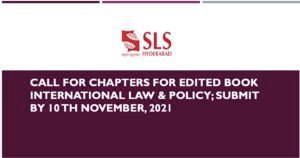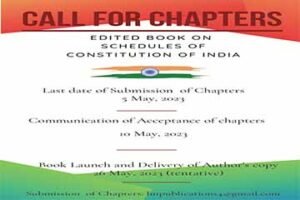Call for Chapters in an edited book on “Ramayana: An Instrument for Indianising Socio-Legal Approaches”
The researcher is expected to conduct research on Ramayana and its nexus with social sciences like law, sociology, economics, political science, state administration etc. The interested researcher should send the title of chapter accompanied by a brief profile of the author/s including Name, Designation, Institutional Affiliation, Contact details, and email ID. Registration is compulsory for author/s.
No Publication charges
| Font :Times New Roman | Font Size: 12 (for Footnotes:10) |
| Word Limit: 3000 – 5000 words (including footnotes) | Line Spacing: 1.5 (for Footnotes 1.0) |
| Citation Method: The Bluebook Style of Citation, 20th Edition | Language: English/ Hindi/ Marathi |
| Authorship may be extended maximum up to two authors | No publication certificate will be provided |
| Hard copy of edited book will be sent to Authors by courier after publication | Link for Registration/ scan the QR code below: https://forms.gle/zc2gEgyd5wihRdKVA |
| In accordance with the double-blind process of review, the name of the author/s and their institutional affiliation must not be mentioned or indicated anywhere in main body of the manuscript. | |
| Submissions shall be through E-mail only & all correspondences and queries may be addressed to: cids@sclc.edu.in | |
| Registration of Title of Chapter | 17th August, 2023 |
| Last Date for Submission of Title, Abstract and Full Chapter | 30th August, 2023 |
| Notification of Selection of Title | 3 working days after the submission of Title |
| Proposed Publication of Book | November 2023 |
Convenors
- Prin. Mr. B. G. Jadhav, Executive Director, Marathwada Mitra Mandal, Maharashtra, India
- Dr. Kranti Deshmukh, Principal, Shankarrao Chavan Law College, Pune, India
- Dr. Pratik Salgar, Co-ordinator, Centre for Interdisciplinary Studies, MM SCLC, Pune, India
Scan the QR Code for Registration

For any query contact: cids@sclc.edu.in
Call for Chapters in an edited book on “Ramayana: An Instrument for Indianising Socio-Legal Approaches”




